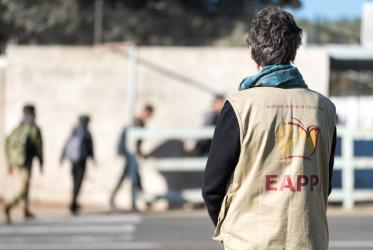The World Council of Churches’ (WCC) condemnation of antisemitism is clear and categorical. WCC regards antisemitism as irreconcilable with the profession and practice of the Christian faith, and a sin against God and humanity. We have reiterated and reaffirmed this condemnation most recently in response to the tragic attack on the Tree of Life Synagogue in Pittsburgh on 27 October 2018, describing that attack as “an appalling violation of our shared humanity.” (cf. https://www.oikoumene.org/en/press-centre/news/wcc-expresses-sympathies-and-condemnation-in-wake-of-pittsburgh-synagogue-shooting)
WCC would welcome a sufficiently precise and sufficiently widely accepted definition of antisemitism to clearly identify instances of condemnable hatred of Jews as Jews, while protecting legitimate criticism of the actions of individuals, groups or of the government of Israel from being falsely characterized as ‘antisemitic’. However, the definition proposed by the International Holocaust Remembrance Alliance (IHRA) does not greatly assist in meeting these purposes. Its vague and inclusive formulation unfortunately tends towards assisting those who would portray any criticism of Israeli government policies as being motivated by antisemitism.
Further, WCC’s description of the IHRA definition of antisemitism as a “non-legally binding working definition” is a reference to the IHRA’s own description of their definition. (cf. https://www.holocaustremembrance.com/working-definition-antisemitism)
The WCC is committed to continuing to accompany and support its member churches, the Palestinian Christian community, and all those who seek a just peace for both peoples in the region based on equal human rights and dignity for all. We cannot accept the misuse of a definition of antisemitism that has the purpose or effect of undermining and precluding that vision.
The WCC has long affirmed – and takes this opportunity to do so again – the right of the State of Israel to exist, within its internationally accepted borders, in full sovereignty and free from the threat of violence. We denounce categorically all violence based on religion, ethnicity, race or any other dimension of a person’s identity or belonging.
With the situation of many Palestinian Christians very much in mind, WCC equally affirms the right of Palestinian people to freedom from military occupation, to self-determination within their own state alongside Israel, and to live their lives in peace. To the extent that specific policies and practices of the Government of Israel obstruct and impede the realization of these rights, we will continue to express our criticism of such policies and practices.
As stated in our earlier response to the recently-published NGO Monitor report, 14 January 2019, WCC expects all nations to respect and apply international human rights and humanitarian law and principles. We do not single out Israel in this regard. Many states fail to meet their commitments and obligations. But after more than 50 years of military occupation, and with Palestinian hopes of the realization of the two-state solution dwindling in the face of the continuing occupation and the lack of effective international engagement, this situation is – tragically – unique, and it touches the soul of all those who look to the Holy Land as the fount of their faith traditions, and for a “light unto the nations”.
We strongly believe that neither the search for a just peace for both peoples of the Holy Land nor the continuing struggle against the poison of antisemitism will be advanced by mis-characterizing criticism of particular policies and actions by the Government of Israel as ‘antisemitic’. On the contrary.
Read also:
WCC responds to misleading report by NGO Monitor and its criticism of EAPPI (WCC press release, 14 January 2019)
For more information: www.eappi.org








